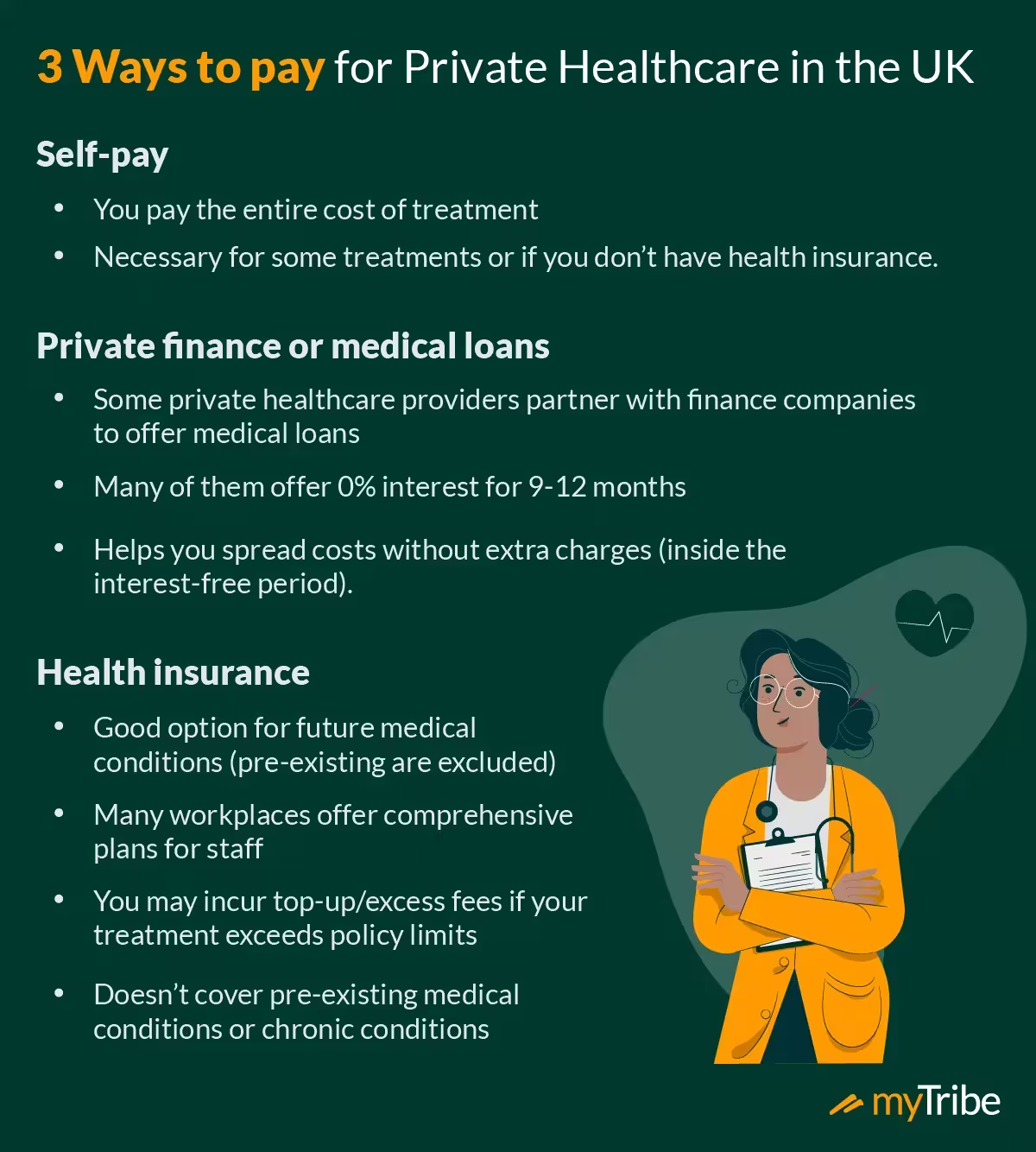What are your options if you're stuck on a waiting list?
If your NHS GP has referred you to a consultant for tests and treatment, you'll receive excellent care but could face a long wait. You may be wondering whether there's an alternative. In this guide, we look at the steps you can take to access treatment more quickly.
Are you stuck on a waiting list and looking for treatment?


Spending time on an NHS waiting list can be frustrating. While Government guidance sets a maximum waiting time of 18 weeks, many patients experience longer waiting times. The most recent statistics show that average waiting times were around 15 weeks, but over 300,000 patients had been waiting for over a year.

Many NHS trusts now offer private healthcare in a private patient unit. These units are typically separate facilities within NHS hospitals. If they partner with a private healthcare provider, they must make this clear, as private providers can't profit by using NHS branding.
The type of private NHS treatment you choose will likely depend on where you are on the waiting list. There are often two stages. You may initially wait to see a consultant for an assessment and tests to decide what treatment you need. Then, you'll wait again for surgery or further treatment.
Here are your options for private NHS treatment.
Paying for your initial consultation
Patient choice is an integral part of private and NHS treatment. If you already know which consultant you want to see or have an appointment letter from the hospital that exceeds the maximum waiting time, you may be able to see them privately. Many consultants offer private treatment in NHS and private hospitals, while others only work privately in private NHS units.
If you have an open referral letter from your GP, you may be able to use this to seek private care. Alternatively, let your GP know you want to pay for a private appointment and request a referral.
Paying privately for your initial consultation can speed things up and give you a quicker treatment decision. Your consultant can also tell you about waiting times so you can decide whether to wait for NHS care or consider further private treatment.
Private diagnostic tests
If you have a physical health issue, your consultant may need blood tests, scans or X-rays before recommending a treatment pathway. Some may be available quickly or can be arranged to take place at the same time as your initial appointment. However, sometimes, it can speed things up if you can pay privately for tests. Your consultant should be able to arrange a quote for private tests during your initial appointment, although you may receive this via post or email after your consultation.
You may also want to explore this option if you've already had your first outpatient appointment but face long waiting times for a scan or other tests.
Paying privately for further treatment
Depending on waiting times, you may decide to go private straight away. However, you'll need to consider what type of treatment you need and the likely costs.
For example, your consultant may immediately recommend surgery, such as a knee replacement. In that case, you can ask for a fixed-price quote for your surgeon to operate privately. However, they may recommend a course of physiotherapy or steroid injections first. Sometimes, consultants suggest lifestyle changes, such as losing weight, before referring you for surgery because they'll increase the chances of success.
Cancer treatment can be lengthy and open-ended, meaning costs can quickly escalate if you go private.
If you need treatment for a mental health condition, your GP surgery can give you a referral for in-person therapy. However, waiting times are lengthy, so many patients face long waits. You may decide to pay for a few treatment sessions to get immediate support for your mental health condition while remaining on the waiting list for NHS treatment.
When you pay for private treatment with a private healthcare provider, you can choose the best consultant and hospital for your needs. If you need surgery, private hospitals typically have hotel-style facilities so you can recover in a private room with an ensuite bathroom and eat high-quality meals.
If you want to see a particular consultant, you'll need to find out which hospitals they work at. If not, there will likely be various alternative hospitals near you. Suppose all the hospitals offer the treatment you need. In that case, you can choose based on recommendations, patients' reviews, and their CQC inspection rating, or you can select the facilities that are most important to you.
Consultant appointments
Most private healthcare providers let you book and pay for consultant appointments online if you have a GP referral. Some providers don't accept a referral from your NHS GP and ask you to use their digital GP service first. Online GP appointments are typically included with health insurance, but some let you pay per appointment.
If your GP has already arranged for diagnostic tests and you have your test results, you or your GP can send these to your consultant before your appointment so they can use the time to recommend further treatment. If not, your consultant can advise you on the tests you need.
Diagnostic tests
You can have tests to investigate your symptoms before seeing a consultant. Sometimes, your GP might need to run tests to confirm what specialist to refer you to. Your GP can give you a private referral for tests or scans if you ask for one. Waiting times for private tests are often shorter than via the NHS, depending on what you need.
When your results arrive, your GP can review them and discuss the next steps. They might conclude you need an operation or other treatment, so you can consider whether you want to pay privately depending on NHS waiting times.
Private care
When you have a diagnosis and treatment recommendation, you can decide whether to pay for your care or wait for NHS treatment. NHS waiting lists prioritise patients based on clinical need, so you'll wait longer for non-urgent treatment than if your condition causes a more severe disability.
It's worth asking your consultant for information to help you compare waiting times. The approach you take will vary depending on the type of treatment you need.
Physical therapy
You can pay for some treatment and combine it with your NHS care. Other therapists can help to relieve your symptoms while you wait for an operation or may help you avoid additional treatment. If your GP or consultant recommends a course of physiotherapy before they assess you again, you can find a local provider and pay for a block of sessions before returning to your GP.
Mental health
If you need mental health support, waiting times can be long, even if you have a referral to a specific therapist. If you're able to, paying for private sessions can help alleviate your symptoms to avoid your condition becoming more serious while you're on a waiting list.
Private surgery
Most private hospitals can give you a fixed-price quote if you need an operation, including your hospital stay, treatment and some follow-up rehabilitation and checks.
You can often book online and usually need to pay a deposit to confirm your appointment. You can often receive treatment in as little as two weeks.
You might consider going abroad to be treated, particularly if the care you need isn't available via the NHS, or you can save money by being treated overseas. You'll need to research to find a suitable provider and make your own travel arrangements.
There are risks associated with travelling abroad for care, and you must consider these carefully before proceeding. There may be a language barrier, and it can be challenging to assess the quality of the treatment you'll receive. Your GP will likely need to arrange follow-up care and rehabilitation when you return home, so you must consider how your treatment provider will share information with them.
Your travel insurance typically won't cover planned medical care, so you'll need to ensure you have suitable coverage so you can get home if anything goes wrong. You'll also need to consider the risk of complications, including an increased risk of infection following an operation. If you're planning to fly, you may also need to speak with your airline to see if there are any travel restrictions after you're treated.

You might like the idea of avoiding NHS waiting lists by paying for your treatment but wonder how you'll afford it. Here are the main ways you can fund your care.
Self-pay
Self-pay does exactly what it says on the tin. It's ideal for people with plenty of disposable income or savings to use for a rainy day. Many people take a self-insurance approach to health, putting money away in an easy-access savings account to pay their medical expenses.
Sometimes, a self-pay approach may be your only option, for example, if you need to see a physiotherapist or seek counselling and don't already have health insurance.
If you need an operation, your chosen hospital can give you a fixed-price quote so you can decide whether to proceed.
Private finance or medical loans
If you don't have sufficient funds to pay for your care upfront, you may be able to spread the cost by taking out a loan or other private financing. You can apply for a loan with your bank or another provider. However, many providers now have partnerships with finance companies offering medical loans. Terms and conditions vary, but many offer 0% interest for nine to twelve months. You can spread the payments without incurring additional costs, provided you can pay off the loan before the interest payments start.
Health insurance (if you already have it)
Health insurance only covers acute conditions that arise after you take out the policy, so you can't buy health insurance to pay for your treatment if you're already on a waiting list. However, it's worth checking to see if you already have insurance through work.
Most policies include access to a virtual GP and coverage for in-patient care. Depending on the policy, you may also have coverage for an outpatient appointment with a consultant and diagnostic tests. There may be an excess, and you might also need to pay a top-up if the policy covers less than the total appointment cost. However, it can reduce your out-of-pocket expenses.

MyTribe guides provide information to help you make an informed choice about your medical care. If you'd like to invest in health insurance in the future, a specialist broker can guide you through your options and help you find the right coverage for your needs. Contact us for a comparison quote, and we'll put you in touch with a regulated broker for tailored advice.
What our readers say
We are rated Excellent on Google from 150+ reviews. Our reviews relate to the service provided by both myTribe and its partners.
Disclaimer: This information is general and what is best for you will depend on your personal circumstances. Please speak with a financial adviser or do your own research before making a decision.












